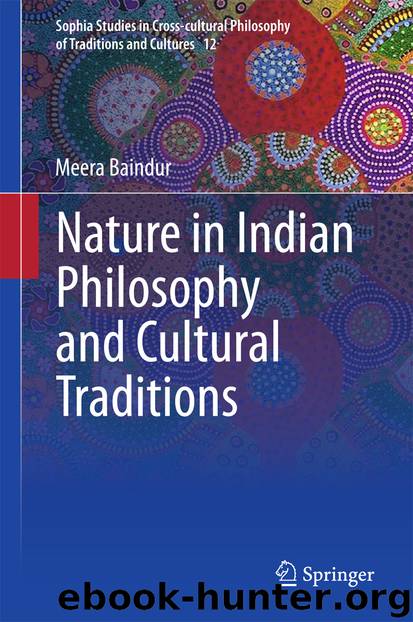Nature in Indian Philosophy and Cultural Traditions by Meera Baindur

Author:Meera Baindur
Language: eng
Format: epub, mobi
Publisher: Springer India, New Delhi
One might argue that these views do not strictly fall under the philosophical understanding of nature, but given the history of Western thought, it is clear that the Romantic Movement’s perception of nature challenged the mechanistic concept of nature. These gave rise to some of the very important debates around the relationship of human beings to nature. It is within the same theme that I seek to understand the categories of landscape features that for the human imagination, are the closest way to identify nature.
There are alternate ways to look at the cultural links between geographical categories and nature. Unlike the geographies of sacred landscape that greatly rely on religious mythology and traditions (to be discussed separately in Chap. 7 of this book), these conceptualisations are closer to our modern understanding of nature as landscape. We will engage with some of the topocentric views of nature from two very different traditions of thought that are not based on philosophical sources and are connected to two non-religious traditions of thought: medicine and geographical literature. The first is a summary of a topocentric view of Āyurvedic categories. The book, Jungle and the Aroma of Meats, by Zimmerman (1999) is a good starting point to explore this area of medicine-based topography. This will be followed by an explanation of some categories that are equivalent to wilderness and human settlements, and the relations between forests and people in India where one can bring together ideas from historians and environmentalists. The second topocentric view is from the concepts of Tamil literary traditions that combine topos (landscape) and human dispositions through a unique category of landscape descriptors called tiṇai . Though scholars would prefer to treat this as a literature project, more suitable to eco-criticism themes, I prefer to classify tiṇai under a topocentric theme. The attempts to link landscape and human emotion are to be found in almost all kinds of poetry and composition, but the analysis and acceptance of this as a literary theory in the poetics has been prevalent much earlier than the discipline of eco-criticism itself that comes to us from the West. In a later chapter, I will use the methods of eco-criticism to analyse other pre-modern Sanskrit literature. The sensibilities of Tamil literature are also different from the rather direct references to nature in other compositions. We will briefly examine the idea of Jaina geography through one of their classical texts. To add to these rich interpretations of landscape, a history of the Bishnoi people’s relationship to their land will be described.
Download
Nature in Indian Philosophy and Cultural Traditions by Meera Baindur.mobi
This site does not store any files on its server. We only index and link to content provided by other sites. Please contact the content providers to delete copyright contents if any and email us, we'll remove relevant links or contents immediately.
| Aeronautics & Astronautics | Astronomy |
| Astrophysics & Space Science | Comets, Meteors & Asteroids |
| Cosmology | Mars |
| Solar System | Star-Gazing |
| Telescopes | UFOs |
Tools of Titans by Timothy Ferriss(8357)
Turbulence by E. J. Noyes(8014)
Secrets of Antigravity Propulsion: Tesla, UFOs, and Classified Aerospace Technology by Ph.D. Paul A. Laviolette(5363)
Astrophysics for People in a Hurry by Neil DeGrasse Tyson(5172)
Room 212 by Kate Stewart(5101)
Design of Trajectory Optimization Approach for Space Maneuver Vehicle Skip Entry Problems by Runqi Chai & Al Savvaris & Antonios Tsourdos & Senchun Chai(5060)
Pale Blue Dot by Carl Sagan(4990)
The David Icke Guide to the Global Conspiracy (and how to end it) by David Icke(4693)
A Journey Through Divination and Astronomy by Publishing Pottermore(4373)
Goodbye Paradise(3795)
Apollo 8 by Jeffrey Kluger(3700)
COSMOS by Carl Sagan(3615)
The Five People You Meet in Heaven by Mitch Albom(3548)
Losing the Nobel Prize by Brian Keating(3531)
How to Read Water: Clues and Patterns from Puddles to the Sea (Natural Navigation) by Tristan Gooley(3454)
Brief Answers to the Big Questions by Stephen Hawking(3416)
How to Read Nature by Tristan Gooley(3322)
The Order of Time by Carlo Rovelli(3180)
A Brief History of Time by Stephen Hawking(3013)
